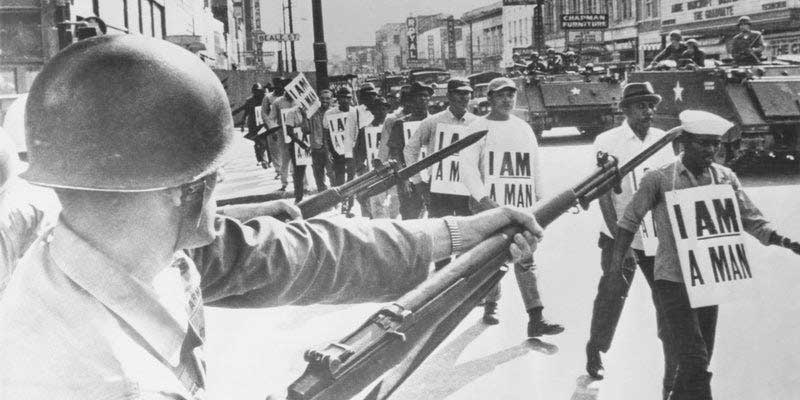Republished with permission from Lucian K. Truscott IV
This above photo is of a march in support of Memphis sanitation workers that Martin Luther King Jr. and Ralph Abernathy led on March 28, 1968. You can see a placard in the background with the phrase adopted by the sanitation workers in their struggle to unionize, “I am a man.”
The march turned violent when a group of white counter-demonstrators who called themselves “The Invaders” began throwing rocks at the marchers.Aides to King pulled him out of the march as the counter-demonstrators grew more violent, chasing marchers down the street.
After a 16-year-old marcher was shot to death by police, the marchers ended up at the Clayborn Temple church. Police bombarded the church with tear gas, clubbing marchers as they lay on the floor of the church to escape the gas.
Memphis Mayor Henry Loeb III, who had led the opposition to the sanitation workers union, declared martial law and called in the National Guard. The next day, several hundred sanitation workers marched in Memphis carrying signs declaring “I am a man,” shown here:
On April 3, at the request of the union organizers, King returned to Memphis and gave his famous “I have been to the mountaintop” speech in support of the sanitation workers at the Mason Temple. In the speech, King made an eerie prediction that he would soon die. “Like anybody, I would like to live a long life; longevity has its place. But I’m not concerned about that now,” he said. “I’ve seen the promised land. I may not get there with you. But I want you to know tonight that we, as a people, will get to the promised land.”
The next day, as he got ready to go to dinner at a friend’s house, Martin Luther King Jr. was shot to death on the balcony of the Lorraine Motel in Memphis, Tennessee.
A campaign to have a national holiday named in King’s honor began shortly after his assassination. It took 15 years for a law to be passed naming the third Monday in January as Martin Luther King Jr. Day. President Ronald Reagan signed the law in 1983, and the holiday was first celebrated in 1986. At first, some southern states refused to celebrate the holiday under King’s name, giving their citizens a day off under another name.
In South Carolina, for example, state employees were given a choice of celebrating Martin Luther King Jr. Day with a day off, or taking one of three holidays celebrating the Confederacy. In 2000, the governor of South Carolina signed a bill making his state the last to celebrate Martin Luther King Jr. Day as an official state holiday. Mississippi and Alabama celebrate the holiday in combination with a state holiday honoring Robert E. Lee on his birthday, January 19.
We are blessed as a nation that Martin Luther King Jr. walked among us for 39 years, exhorting his fellow citizens to live up to the nation’s founding principle that all men are created equal. We’re not there yet, but without him, the struggle would be longer and far bloodier.

Lucian K. Truscott IV
Lucian K. Truscott IV, a graduate of West Point, has had a 50-year career as a journalist, novelist and screenwriter. He has covered stories such as Watergate, the Stonewall riots and wars in Lebanon, Iraq and Afghanistan. He is also the author of five bestselling novels and several unsuccessful motion pictures. He has three children, lives in rural Pennsylvania and spends his time Worrying About the State of Our Nation and madly scribbling in a so-far fruitless attempt to Make Things Better.

